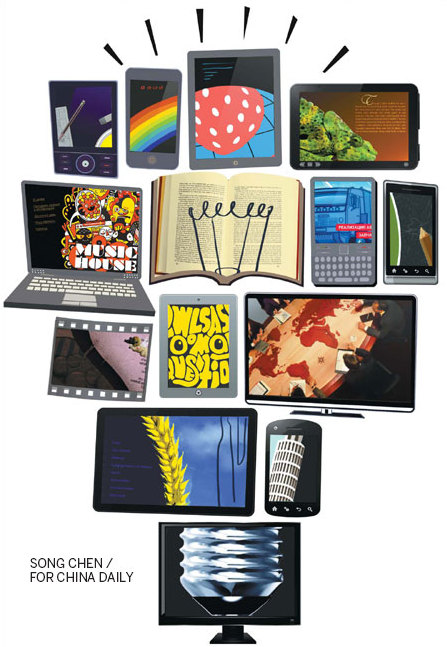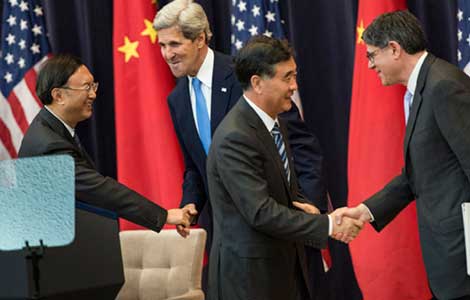Coming to a screen near you
Updated: 2013-07-11 08:07
By Zhang Yuchen (China Daily)
|
||||||||

Traditional publishers are taking unusual steps as they seek to make the move into the digital age where the printed page is no longer all the rage, as Zhang Yuchen reports.
As China's digital publishing industry continues to grow, publishers are looking for new ways of obtaining and telling stories. Gone are the days when authors simply penned their tales, presented them to the publisher houses and hoped for the best.
Now, the book companies are taking an active role in gathering story ideas, often by diverse means such as adapting game apps for iPhones into children's books or turning popular TV dramas into novels.
In addition, several of China's best-known, long-established publishers are using the digital arena as a shop window for their products in the hope of boosting sales of books in brick and mortar stores.
In September, one of China's oldest publishing houses, the 101-year-old Zhonghua Book Co, entered the world of multimedia publishing by instigating a poetry contest that targeted mobile phone users.
The format was simple: Applicants simply had to compose an ode using the rigid formulas of classical Chinese poetry and send the resulting poem to Zhonghua via a text message. Over a period of four months, 43 million wannabe poets texted their work, either as original content for the competition or as messages to friends, who in turn forwarded the poem to other recipients. Software containing a template for the poem and the rules of composition was downloaded more than 50,000 times in one month.
By the end of the competition, the number of posts and reposts on mobile devices totaled 129 million, a huge number given that Zhonghua's biggest-selling physical book, Thoughts on the Analects of Confucius sold 320,000 copies.
"The competition was our attempt to popularize ancient Chinese literature in the modern age and to market the brand of our publishing house, which is famous for classical Chinese texts," said Bao Yan, Zhonghua's president.
It was the first time that Bao and her team had attempted to promote and develop the physical market potential of classical Chinese literature via the digital medium. Zhonghua estimated the revenue from the competition at 9 million yuan ($1.5 million), although the publisher had to split that sum with the telecom companies and its other partners.
Publicity boost
However, rather than hard cash, the publicity boost for Zhonghua's traditional publications was the most valuable thing to emerge from the competition, according to Bao. Meanwhile, the lessons learned from cooperating with local governments and technological partners could prove invaluable as the company looks to the future.
Zhonghua is just one of a group of traditional publishers attempting to carve out a niche in the multimedia world, but they are finding the going tough.
In the past three years, the income brought in by digital products has accounted for less than 10 percent of the annual revenue of the Foreign Language Teaching and Research Press.
That disparity stems from a lack of familiarity with operating methods in the world of digital publishing. "No one in the publishing world knows how to benefit from it (digital publishing) in terms of finances and branding," said Li Hongfei, the director of the language press' digital department.
"We may have good ideas, but without obvious signs of return publishing houses are reluctant to invest their money in a digital arm. All in all, the major businesses are still focusing on traditional paper productions."
Li's comment echoed a quip made by the language press' Deputy President, Xie Wenhui: "Doing nothing in the multimedia world means we are just sitting still and waiting to die, but taking action in the market could mean we die more quickly."
However, Lin Hua, deputy president of Cloudary, the biggest online hub for contemporary Chinese literature, said at the StoryDrive China forum organized by the Frankfurt Academy in May that online content can be a money spinner, especially if marketed correctly across a range of formats.
For example, the novel If You are the One by Fu Rong San Bian, one of Cloudary's biggest sellers, became one of the most successful examples of the transmedia trend when it was later made into a movie by the Chinese director Feng Xiaogang.
No quick returns
The branding effect is already evident; best-selling e-books can have a positive influence on sales of the equivalent paper publication. "The digital performance of a book often provides clues to potential sales in brick and mortar stores, but it will be a long-term process, even with clear goals and a good plan of action," said Li. "No one should expect a quick financial return."
Wang Hui, chief editor of the Chinese-language version of Psychology magazine, said: "Traditional publishers enjoy the advantages of being well established and enjoy good reputations in the industry, but those factors can also prove to be shortcomings."
Like Zhonghua, Sanlian Publishing House put a new twist on a traditional industry when it opened a workshop for authors, graphic artists and, crucially, readers, in 2009.
Work and story ideas are submitted online and if the readers judge the material to have potential, the authors and artists are invited to attend the workshop and develop their ideas in collaboration with the readers. Zhang Zhijun, Sanlian's deputy head sees the workshop as a major influence on the publisher's future development.
Sanlian is no stranger to innovation. In 2003, it was the first publishing house on the Chinese mainland to publish graphic novels, such as those by the popular Taiwan-based cartoonist Jimmy.
"The open nature of the workshop offers more opportunities to get to know authors from all walks of life, people with special ideas they would like to share through our platform, " said Zhang.
Interactivity
Meanwhile, illustrated and interactive books are now assuming greater importance for publishers and the format of the workshop, equally open to creative types and their audience, means publishing in the digital world can break accepted rules. For example, some companies have given readers the opportunity to influence the course of stories published in installments by asking for, and often incorporating, their ideas on story and character development.
"Interactivity in the reading process, no matter at what stage, is winning more readers because people have become accustomed to it through computer games and related activities," said Holger Volland, deputy president of the Frankfurt Book Fair.
"As we all know, in the search for good content, uniqueness and novelty are more important than anything else," said Zhang, who decided to retain full independence of the workshop by declining all offers of financial support and cooperation from other organizations: "We have to maintain our purity; that way we can produce a lasting and sustainable future in the publishing world."
Zhonghua's Bao believes in the merits of classical Chinese literature and regards her company as being in a unique position as it acts as a cheerleader for, and repository of, ancient literature. To that end, the company is exploring the potential of promoting the classics through "fragmentation", that is, by publishing free extracts from classic works in the hope that readers will be enthralled and rush to the stores to buy a copy of the book in question.
For Sanlian, the path seems clear but also hard. Around 99 percent of the illustrated books it publishes and sells in its own bookstores are written by foreign authors.
"We lack local talent to create good material that will prove competitive," said Zhang. "It's an opportunity as well as a challenge. If we get it right, we will be starting on the road to success."
Contact the writer at zhangyuchen@chinadaily.com.cn
(China Daily USA 07/11/2013 page7)

 China, Russia complete 3-day joint naval drill
China, Russia complete 3-day joint naval drill
 US drone completes 1st carrier landing
US drone completes 1st carrier landing
 Sino-US talks 'help build trust'
Sino-US talks 'help build trust'
 Boston Marathon bombing suspect pleads not guilty
Boston Marathon bombing suspect pleads not guilty
 Caution urged in seeking experts from abroad
Caution urged in seeking experts from abroad
 Shanghai struggles with growth
Shanghai struggles with growth
 Trade town turns to tourism
Trade town turns to tourism
 Project focuses on unmarried youths
Project focuses on unmarried youths
Most Viewed
Editor's Picks

|

|

|

|

|

|
Today's Top News
Smithfield CEO quells fears over Chinese purchase
Beijing has world's most delayed airport
Caution urged in seeking experts from abroad
Snowden is likely Venezuela bound
Talks 'help build trust' between China, US
Obama pushes House Republicans on immigration
Chinese researcher pleads guilty in US drug case
US Navy completes 1st unmanned carrier landing
US Weekly

|

|





